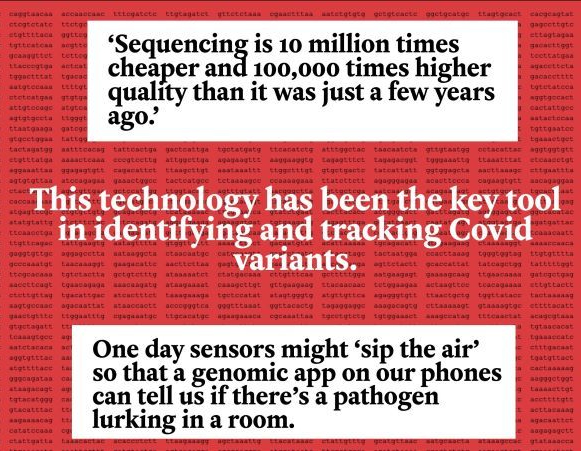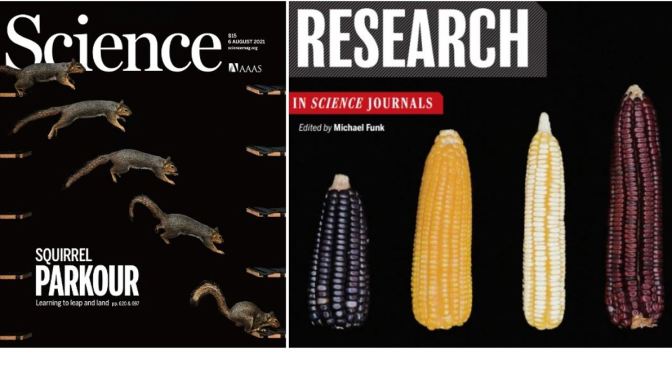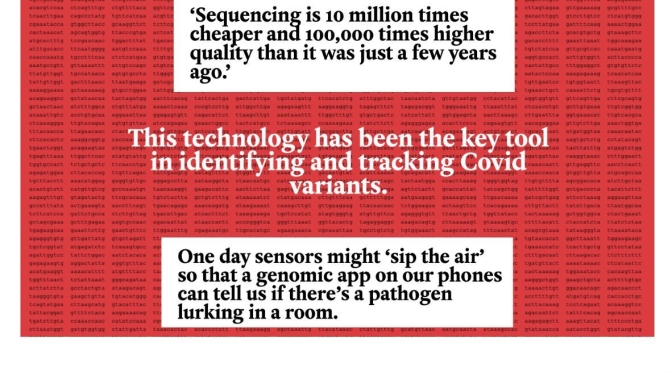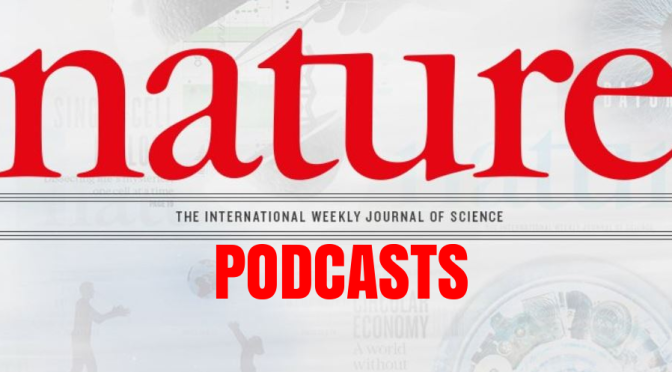An a-maize-ing set of genomes, a durable way to keep cool, and how squirrels learn to leap and land without falling.
— Science Magazine (@ScienceMagazine) August 5, 2021
📕 Read the latest in Science: https://t.co/MegitCo7A6 pic.twitter.com/PBNkozIvsS
Tag Archives: Genomes
Biotechnology: ‘Genome Sequencing – Unlocking The Covid Code’ (NY Times)
The advent of commercial genome sequencing has recently, and credibly, been compared to the invention of the microscope, a claim that led me to wonder whether this new, still relatively obscure technology, humming away in well-equipped labs around the world, would prove to be the most important innovation of the 21st century.


And unexpectedly, Covid-19 has proved to be the catalyst. “What the pandemic has done is accelerate the adoption of genomics into infectious disease by several years,” says deSouza, the Illumina chief executive. He also told me he believes that the pandemic has accelerated the adoption of genomics into society more broadly — suggesting that quietly, in the midst of chaos and a global catastrophe, the age of cheap, rapid sequencing has arrived.
Science Podcast: Human Genome Sequencing – 20 Years Of Research & Data

This week we’re dedicating the whole show to the 20th anniversary of the publication of the human genome. Today, about 30 million people have had their genomes sequenced. This remarkable progress has brought with it issues of data sharing, privacy, and inequality.
Host Sarah Crespi spoke with a number of researchers about the state of genome science, starting with Yaniv Erlich, from the Efi Arazi School of Computer Science and CEO of Eleven Biotherapeutics, who talks about privacy in the age of easily obtainable genomes. Next up Charles Rotimi, director of the Center for Research on Genomics and Global Health at the National Human Genome Research Institute, discusses diversity—or lack thereof—in the field and what it means for the kinds of research that happens. Finally, Dorothy Roberts, professor in the departments of Africana studies and sociology and the law school at the University of Pennsylvania, talks about the seemingly never-ending project of disentangling race and genomes.
Covid-19: What Are The New Variants & How Are They Monitored (Podcast)
Over the course of the pandemic, scientists have been monitoring emerging genetic changes to Sars-Cov-2. Mutations occur naturally as the virus replicates but if they confer an advantage – like being more transmissible – that variant of the virus may go on to proliferate.
This was the case with the ‘UK’ or B117 variant, which is about 50% more contagious and is rapidly spreading around the country. So how does genetic surveillance of the virus work? And what do we know about the new variants? Ian Sample speaks to Dr Jeffrey Barrett, the director of the Covid-19 genomics initiative at the Wellcome Sanger Institute, to find out Coronavirus – latest updates See all our coronavirus coverage.
Top Science Podcasts: Sequencing Genomes, Genetic Surveillance And Solar Winds (Nature)
 Hear the latest science news, brought to you by Benjamin Thompson and Shamini Bundell. This week, exploring two very different issues surrounding genomic sequencing, and the latest results from NASA’s Parker Solar Probe.
Hear the latest science news, brought to you by Benjamin Thompson and Shamini Bundell. This week, exploring two very different issues surrounding genomic sequencing, and the latest results from NASA’s Parker Solar Probe.
In this episode:
00:45 The GenomeAsia 100k project
Researchers have released the first data from an ambitious project to sequence the genomes of 100,000 people from populations across Asia. Research Article: GenomeAsia100K Consortium
08:56 Research Highlights
Bare riverbanks make meanders move, and human activity affects picky penguins. Research Highlight: The meandering rivers that speed across barren landscapes; Research Highlight: Climate change splits two penguin species into winners and losers
11:18 Curbing the rise in genetic surveillance
Concerns are growing around the use of commercial DNA databases for state-level surveillance. Comment: Crack down on genomic surveillance
20:02 News Chat
NASA’s Parker Solar Probe has sent back the most detailed information yet about the birthplace of solar wind. News: Sun-bombing spacecraft uncovers secrets of the solar wind





